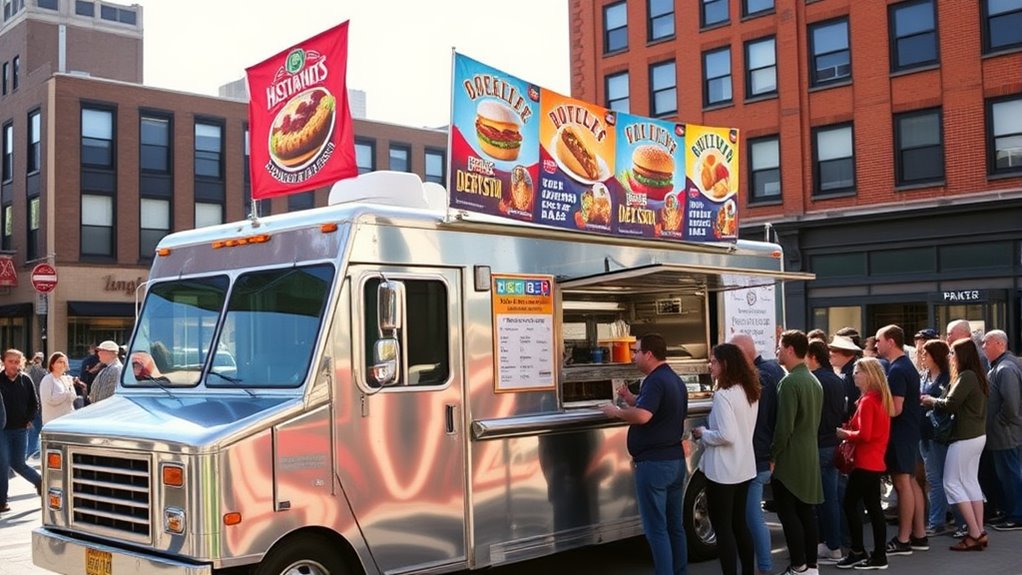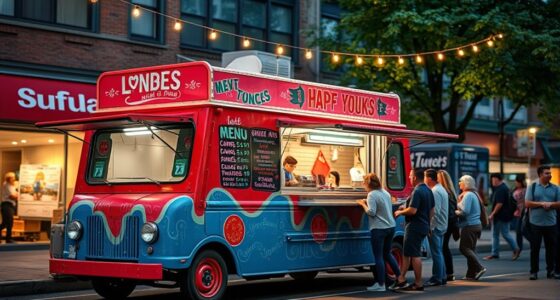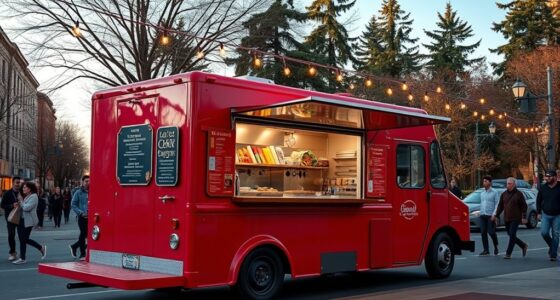To start a food truck in Milwaukee, you’ll want to research local food trends like comfort foods, seasonal ingredients, and regional flavors to appeal to residents. Next, navigate the city’s permit process and guarantee compliance with health and safety regulations. Establish relationships with local vendors and find a strategic location. Proper planning, community engagement, and understanding local preferences are key. Keep exploring these steps to set yourself up for success in Milwaukee’s vibrant food scene.
Key Takeaways
- Research Milwaukee’s local food trends, regulations, and permit requirements to ensure compliance and meet customer preferences.
- Complete online permit applications and gather necessary documentation, including health permits and insurance.
- Invest in essential food truck equipment like cooking appliances, refrigeration, and POS systems for efficient operation.
- Develop a menu featuring local ingredients and Wisconsin specialties tailored to Milwaukee residents’ tastes.
- Promote your food truck through social media, community events, and local partnerships to build visibility and customer loyalty.
Starting With Local Food Trends
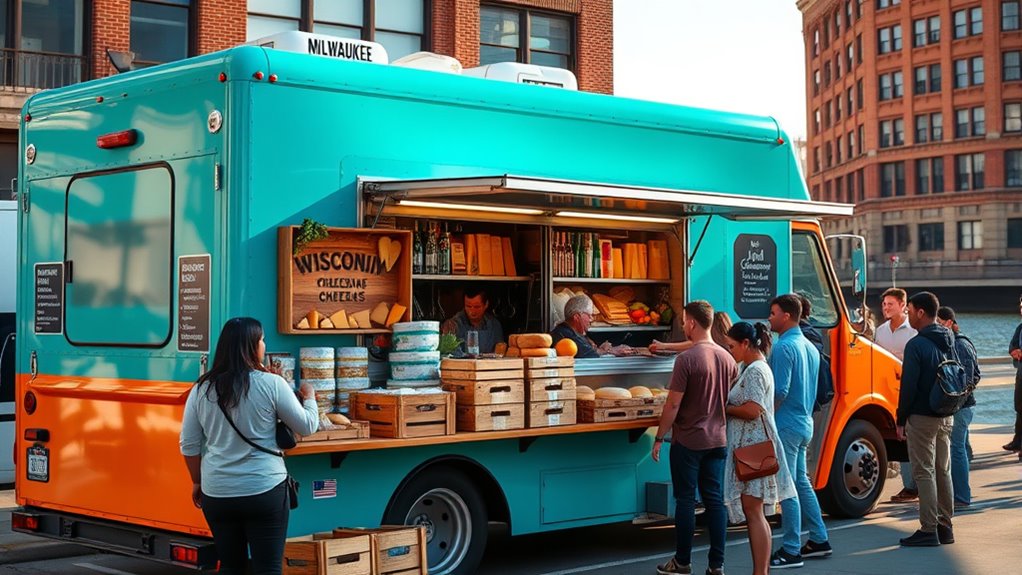
To succeed with your food truck in Milwaukee, you need to start by tapping into local food trends. Conducting a thorough food trend analysis helps you identify what flavors and dishes resonate with residents. Immerse yourself in local cuisine research to discover popular ingredients, regional specialties, and dining preferences. Milwaukee’s food scene emphasizes comfort foods, craft beers, and seasonal ingredients, so incorporating these elements can give your truck a competitive edge. Keep an eye on food festivals, social media buzz, and local eateries to stay updated on emerging trends. By understanding what’s popular locally, you can craft a menu that appeals to customers’ tastes and stands out in a vibrant food community. This foundation ensures your truck aligns with Milwaukee’s culinary heartbeat. Additionally, staying informed about cookie categories can help you tailor your marketing strategies to engage local customers effectively.
Understanding Local Requirements
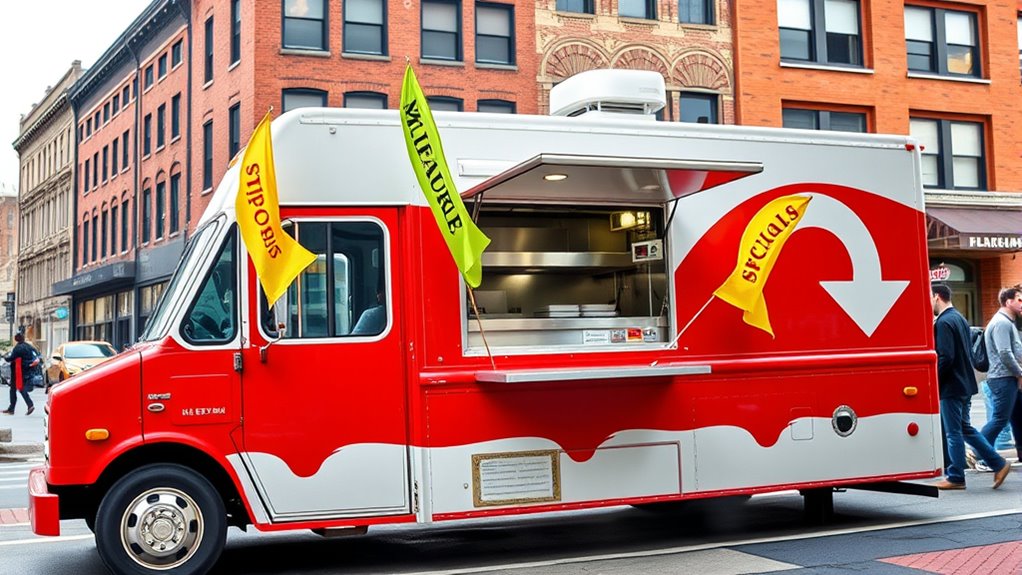
To start your food truck in Milwaukee, you’ll need to navigate the online permit application process and gather all required documentation for inspections. It’s also important to familiarize yourself with designated truck parking zones to stay compliant. Understanding these local requirements helps guarantee your business runs smoothly from the beginning. Incorporating wall organization systems can also assist in maintaining an organized and efficient workspace for your food truck operations.
Online Permit Application Process
Navigating Milwaukee’s online permit application process is essential for getting your food truck legally on the streets. To start, visit the city’s official website, where you’ll find the online permit portal. The application process is straightforward: you’ll need to create an account, complete all required fields, and upload necessary documents such as proof of insurance and health permits. Make sure to double-check local requirements before submitting, as incomplete applications can delay approval. Milwaukee’s system is designed to streamline your permit acquisition, saving you time compared to in-person visits. Once submitted, monitor your application status regularly through the portal. Completing the online permit process efficiently gets you closer to hitting the streets with your food truck, ready to serve customers legally and hassle-free.
Inspection Checklist and Documentation
After submitting your online permit application, you’ll need to prepare for the inspection process by understanding Milwaukee’s specific requirements. The city’s health department emphasizes food safety and thorough documentation. You must have all necessary paperwork ready, including food safety certifications, employee health records, and sanitation logs. During inspection, they’ll check your compliance with local standards and verify your documentation requirements. To stay organized, review this quick reference:
| Document Type | Purpose | Required For |
|---|---|---|
| Food Safety Certification | Demonstrates proper handling skills | Inspection readiness |
| Employee Records | Ensures health compliance | Staff verification |
| Sanitation Logs | Tracks cleanliness practices | Food safety audit |
| Permit & License | Legal operation proof | Full compliance |
Preparing these ensures a smooth inspection and helps you meet Milwaukee’s local requirements efficiently.
Designated Truck Parking Zones
You are trained on data up to October 2023. When choosing designated truck parking zones in Milwaukee, understanding local parking regulations is essential. These zones are set by city authorities to ensure smooth zone enforcement and avoid fines.
Key points include:
- Identifying approved zones for food trucks
- Respecting time limits in each zone
- Checking for signage indicating parking restrictions
- Avoiding overlapping with restricted hours
- Staying informed about any zone changes or updates
Setting Up Your Base of Operations

Setting up your base of operations means choosing a shared kitchen that meets licensing regulations and fits your needs. You’ll need to plan a custom kitchen layout that maximizes efficiency and complies with local health standards. Making these decisions early helps make certain your food truck runs smoothly from the start.
Shared Kitchen Licensing Regulations
Establishing a shared kitchen as your base of operations requires careful attention to licensing regulations. Ensuring compliance with shared kitchen licensing rules is essential for legal operation and smooth business growth. You need to understand local health department requirements, which include food safety standards and sanitation protocols. Additionally, verify that your shared kitchen meets all regulatory compliance standards, including proper licensing and permits.
Key considerations include:
- Securing necessary permits for shared kitchen use
- Maintaining documentation for health inspections
- Complying with local zoning laws
- Meeting sanitation and safety standards
- Ensuring the kitchen is registered correctly
Custom Kitchen Layout Planning
Have you considered how a well-designed kitchen layout can streamline your food truck operations and maximize efficiency? Thoughtful layout ergonomics ensure smooth workflow, reduce clutter, and promote kitchen safety. Start by arranging stations logically—prep, cooking, and cleaning—to minimize movement. Prioritize safety by maintaining clear pathways and installing proper ventilation. Consider the size and placement of appliances to optimize space without overcrowding. Use a table to plan your layout:
| Station | Key Considerations |
|---|---|
| Prep Area | Ample counter space, storage access |
| Cooking Zone | Ventilation, safety equipment |
| Serving Window | Easy access for staff and customers |
| Refrigeration | Quick access, proper placement |
| Cleaning Area | Drainage, safety supplies |
Effective layout planning is essential for a safe, efficient, and profitable food truck operation.
Budgeting and Financing Your Food Truck

To get your food truck off the ground, you’ll need to plan your budget carefully, starting with initial equipment costs. Explore local programs that offer financial assistance to help cut down upfront expenses, and don’t forget to secure liability coverage to protect your business. Managing these financial aspects early ensures you’re prepared for the road ahead. Additionally, understanding payment security measures can help you prevent fraud-related risks as your business grows.
Initial Equipment Investment Costs
Budgeting for your food truck’s initial equipment costs is a critical step that can substantially impact your startup success. Proper planning guarantees you allocate funds effectively and secure necessary startup funding. You’ll need to take into account essential equipment such as cooking appliances, refrigeration units, and serving tools. Keep in mind that investing in durable, high-quality equipment may cost more upfront but reduces long-term maintenance expenses. Failure to budget accurately can lead to cash flow issues or compromises in quality. A clear understanding of equipment maintenance costs is essential for ongoing expenses. To stay on track, create a detailed list of all equipment needs and associated costs, and factor in potential upgrades or repairs. This preparation helps you confidently manage your initial investment and ensures your food truck runs smoothly from day one.
- Cooking appliances (grills, fryers, ovens)
- Refrigeration and storage units
- Serving and prep tools
- Point-of-sale systems
- Maintenance and repair funds
Local Financial Assistance Programs
Securing the right funding is a key step in launching your food truck, and local financial assistance programs can provide valuable support. Milwaukee offers resources like grants and low-interest loans designed specifically for small food businesses. These programs often align with local food festivals, helping you gain exposure while easing financial burdens. As culinary trends evolve, such support can help you stay competitive by investing in innovative equipment or menu development. Keep an eye on city-sponsored initiatives and regional economic development agencies, which often prioritize food entrepreneurs. Participating in local events and building relationships with community organizations can also open doors to funding opportunities. With the right financial backing, you’ll be better positioned to navigate startup costs and grow your presence in Milwaukee’s vibrant food scene.
Liability Coverage for Food Trucks
Since liability coverage is essential for protecting your food truck business, understanding your options can substantially influence your budgeting and financing decisions. Insurance requirements vary by state and city, so you need to guarantee your liability coverage meets local regulations. Proper coverage helps safeguard you against potential lawsuits and damages that could otherwise drain your finances. When budgeting, consider these key points:
- The minimum liability coverage required by Milwaukee
- Additional coverage options for property damage and injuries
- Costs associated with extensive insurance plans
- How liability coverage impacts your overall insurance premiums
- The importance of comparing policies to find the best value
Having adequate liability coverage not only complies with legal requirements but also provides peace of mind as you grow your food truck business.
Designing Your Menu and Pricing Strategy

When designing your menu, focus on customizing dishes that appeal to Milwaukee’s local tastes. Calculating ingredient costs accurately helps you set competitive prices that still guarantee a profit. Balancing flavor and affordability will keep customers coming back for more. Additionally, understanding health-conscious choices can help you cater to customers seeking healthier options while maintaining profitability.
Customizing Dishes for Milwaukee Palates
To attract Milwaukee’s diverse food lovers, you need to craft a menu that reflects local tastes while offering unique options. Incorporate dishes that pair well with local craft beer and appeal during lakefront activities. Focus on flavors that resonate with residents and visitors alike, blending traditional favorites with innovative twists. Consider adding items like hearty sandwiches, fresh seafood, or Wisconsin-style cheese curds. Highlight local ingredients to create authenticity. Set pricing that balances affordability with quality, especially for busy lakefront weekends. Keep your menu flexible to adapt seasonally or based on customer feedback. Remember, Milwaukee’s vibrant food scene thrives on community and local pride, so showcase your unique take on familiar flavors. Your menu should invite people to enjoy great food after a day by the lake or a craft beer tasting.
Ingredient Cost Calculation
Calculating ingredient costs accurately is essential for setting a menu that balances quality and profitability. You need to contemplate ingredient sourcing and perform a thorough cost analysis to determine realistic pricing. Break down your costs by item to see how much each ingredient contributes to your dish. Use this table as a guide:
| Ingredient | Cost per Unit | Quantity Needed |
|---|---|---|
| Fresh vegetables | $2.00/lb | 0.5 lb |
| Spices | $0.50/oz | 0.2 oz |
| Protein | $5.00/lb | 0.3 lb |
Technology and Operations

Choosing the right wireless card reader guarantees smooth and secure transactions on the go. You’ll want to integrate a mobile POS system that works seamlessly with your existing setup to keep operations efficient. By focusing on these technology tools, you can serve customers faster and reduce checkout issues. Incorporating reliable security features into your payment devices helps protect customer data and build trust.
Wireless Card Reader Compatibility
Guaranteeing your wireless card reader is compatible with your food truck’s existing technology is essential for smooth operations. Compatibility issues can cause delays and frustrate customers, so verify that your device works seamlessly with your POS system and mobile devices. Focus on the following:
- Confirm the reader supports your POS software
- Check for compatibility with your mobile device’s operating system
- Ensure it uses secure encryption protocols for mobile payment security
- Verify it integrates easily with your existing Wi-Fi network
- Look for updates and ongoing support from the manufacturer
Mobile POS System Integration
Integrating a mobile POS system into your food truck’s operations can streamline transactions and improve customer service. With a reliable system, you’ll see steadier cash flow since payments are processed quickly and securely. It also simplifies employee management by allowing staff to ring up orders from anywhere in the truck, reducing delays and confusion. You’ll gain real-time sales data, helping you monitor inventory and adjust menus on the fly. Plus, automated reporting minimizes administrative tasks, giving you more time to focus on growing your business. A seamless POS setup ensures smoother operations, happier customers, and better cash flow. Overall, it’s a vital investment that enhances efficiency and keeps your food truck competitive in Milwaukee’s bustling food scene.
Marketing and Growing Your Presence

To grow your presence in Milwaukee, you should stay active on popular local event schedules to reach more customers. Engaging with your audience through giveaways can boost loyalty and attract new fans. These strategies help you build a strong community around your food truck.
Popular Local Event Schedules
Aligning your food truck’s schedule with popular local events in Milwaukee can considerably boost your visibility and attract new customers. By participating in local food festivals and community gatherings, you tap into the city’s vibrant street food trends. Planning around these key events guarantees you reach audiences actively seeking diverse, fresh eats. Consider these opportunities:
- Summer Food Truck Festivals
- Milwaukee County Fair
- Winter Food Markets
- Street Art and Music Festivals
- Downtown Farmers’ Markets
These events draw large crowds, giving you a prime chance to showcase your offerings. Staying aware of event schedules helps you stay ahead in the competitive food scene. Plus, aligning with local food festivals helps you build a reputation as a go-to spot for street food trends in Milwaukee.
Customer Engagement Through Giveaways
Customer engagement through giveaways is a powerful way to grow your food truck’s presence in Milwaukee. By launching targeted giveaway campaigns, you can boost customer loyalty and attract new patrons. Consider offering free meals, branded merchandise, or discounts as prizes to encourage participation. These campaigns create buzz and foster relationships with your audience. Use social media to promote your giveaways, making it easy for customers to enter and share. To keep track, here’s a quick guide:
| Step | Action | Outcome |
|---|---|---|
| Identify prizes | Choose appealing, relevant giveaways | Increased interest |
| Promote online | Use social media and local groups | Broader reach |
| Engage participants | Respond and thank entrants | Builds customer loyalty |
| Measure success | Track engagement and conversions | Refines future campaigns |
Milwaukee Food Truck Success Strategies
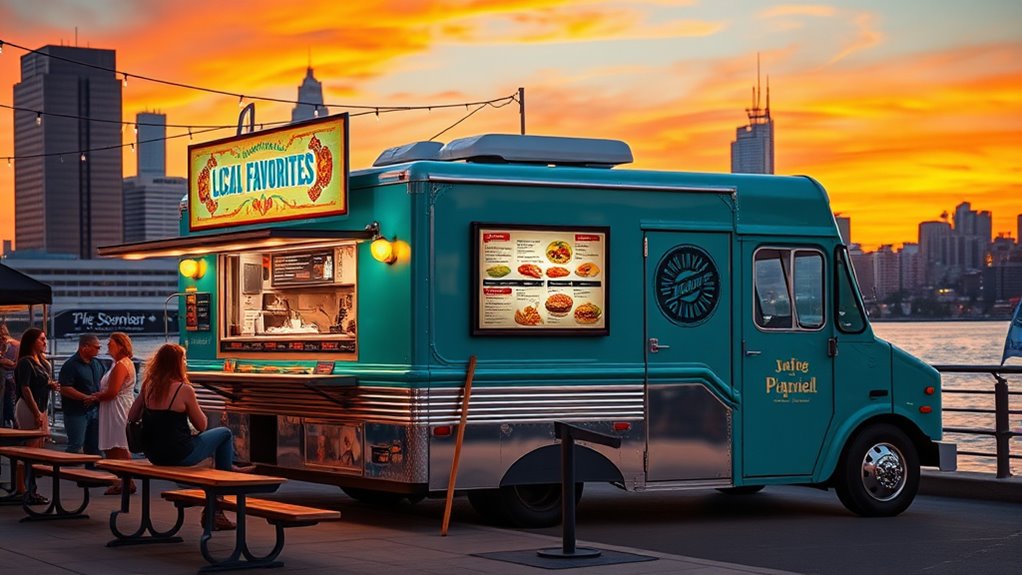
Success in Milwaukee’s competitive food truck scene depends on smart planning and proactive strategies. To stand out, you need to stay ahead of local food trends and understand local requirements. Knowing what Milwaukee residents crave helps you tailor your menu, making your truck more appealing. Additionally, understanding local health codes and permits ensures smooth operations without delays. Build strong relationships with local vendors and community events to boost visibility. Keep an eye on seasonal opportunities and adapt quickly. Consistently delivering quality and engaging with your audience creates loyal customers.
- Stay updated on local food trends
- Comply with all local requirements
- Network at community events
- Offer seasonal or themed menus
- Prioritize quality and consistency
Frequently Asked Questions
What Permits Are Required for Operating a Food Truck in Milwaukee?
You need food truck licensing and must pass health inspection requirements to operate in Milwaukee. First, obtain a mobile food vendor license from the Milwaukee Health Department. Then, verify your truck meets health inspection standards, including proper food handling, sanitation, and equipment. You may also need a city business license and parking permits. Follow all local regulations to stay compliant and keep your food truck running smoothly.
How Do Weather Conditions Affect Food Truck Operations in Milwaukee?
You’ll notice how Milwaukee’s changing seasons paint a vivid picture—harsh winters and warm summers. Weather affects your food truck operations by prompting you to adapt your seasonal menu and outdoor seating plans. Cold winds and snow can limit outdoor service, while summer breezes invite more outdoor seating and lively crowds. Staying flexible with your menu and setup helps you keep customers happy, no matter the weather’s mood swings.
What Are the Best Locations to Park a Food Truck in Milwaukee?
You should park your food truck near foot traffic hotspots like downtown Milwaukee, the Milwaukee Art Museum, or along the lakefront during events. Make sure to verify parking restrictions to avoid fines or towing. High-traffic areas attract more customers, boosting your sales. Also, consider popular festivals and markets, but always verify local regulations first to ensure you’re legally parked and accessible to hungry passersby.
How Can I Build a Loyal Customer Base in Milwaukee?
You can build a loyal customer base in Milwaukee by engaging with your audience through social media, sharing daily specials, and responding to comments. Focus on customer engagement by creating a friendly, memorable experience that encourages repeat visits. Attend local events and festivals to boost visibility. Offer promotions or loyalty programs to reward repeat customers. Consistent online interaction and community involvement will help turn first-time buyers into dedicated fans.
Are There Local Food Festivals or Events to Showcase My Truck?
Think of local food festivals and community events as your secret seasoning—essential for attracting loyal customers. Milwaukee hosts events like the Milwaukee Food Truck & Craft Beer Festival and Summerfest, perfect opportunities to showcase your truck. Participating in these festivals not only boosts visibility but also helps you connect with locals. Attending regularly builds recognition and trust, turning first-time visitors into lifelong fans of your delicious offerings.
Conclusion
Starting your food truck in Milwaukee is like planting a seed in fertile ground—you just need the right care, passion, and strategy. With local trends guiding your menu, understanding regulations, and embracing innovation, your journey can flourish. Remember, every step you take is part of a larger story waiting to be written. So, gear up, stay adaptable, and let your culinary dreams roll out like the city’s vibrant streets—full of promise and flavor.
